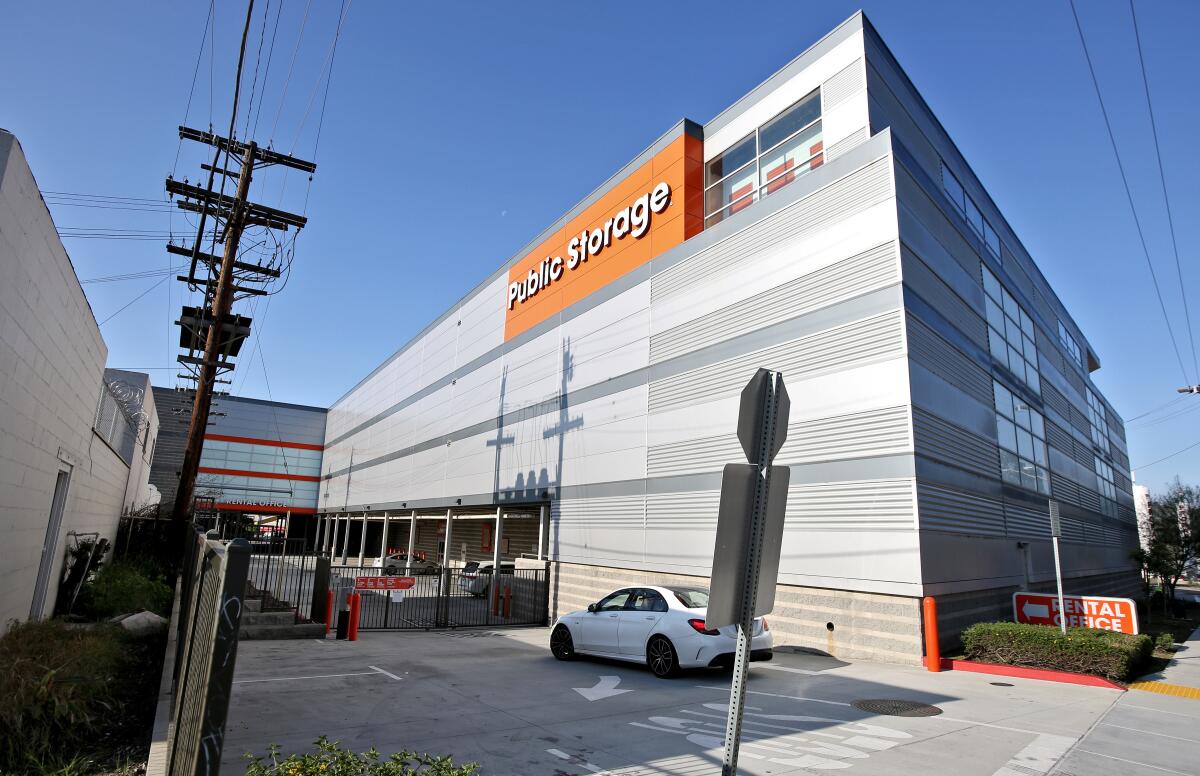L.A. halts storage-unit evictions during the coronavirus

- Share via
People who rent storage units in the city of Los Angeles and are unable to pay their rent got some relief from the city last week.
Storage-unit renters financially strained by the coronavirus can defer payments now, and for up to three months after the city calls an end to its local state of emergency, according to the new law passed by the City Council and signed by Mayor Eric Garcetti.
Here’s how it works.
First, it’s not rent forgiveness; at the end of the three months after the city’s emergency is over, all back payment is due.
During the deferment, renters cannot be evicted or charged late fees. Tenants and storage unit facility operators have the discretion to work out a payment plan, but it’s not required by the law.
Storage facility operators have 15 days from when the law went into effect to notify renters of their rights. Renters who want to defer payments must write to the storage facility operator within seven days of payment being due, and be able to show they were financially impacted in some way by COVID-19.
Passed with an urgency clause, the law went into effect immediately after Garcetti signed it on Wednesday — days before the first of the month brought June rent bills. And the rules apply only to storage units within the city of Los Angeles.
“We’re telling you stay at home, be safe. Well, how could you be safe and how could you focus on your health and your family’s health if you’re worried about losing your belongings? Or getting evicted?” said Councilman David Ryu, the bill’s author.
The new law affords storage renters coronavirus protections similar to those that have been given to residential and commercial renters. Although storage renters represent a fraction of overall renters, thousands could be affected by the new law that several experts said is the first of its kind. California is home to roughly 3,500 storage facilities, according to Self Storage, and has the most expensive storage rents in the country, according to statistics compiled by Neighbor, a company that matches people’s empty space with people who need to store items.
With millions of people applying for unemployment during the coronavirus outbreak, storage represents another monthly bill many can’t pay right now. Unlike an apartment, where a landlord would need to go through a lengthy legal process to lock a tenant out of their unit, storage facility operators can do so within days if a tenant is issued a lien and doesn’t pay. Operators, once back in possession of the storage unit, can auction all the items. For some, like Rebecca Wu, those items include family photo albums, or what she described as “sacred stuff.”
Self-storage industry consultant Jim Chiswell said the city’s action interferes with the free market, in part by creating “an artificial future date” for the pandemic’s end.
He added that the industry has collectively adopted many of the protections written into the Los Angeles law, including delaying auctions and tabling rent increases.
“There’s a real desire to work with our customers nationwide,” Chiswell said.
Toby Marcell, of Houston, said in an email that he was threatened with eviction from his Public Storage unit on April 20.
“They did insist we pay for the month, although I’ve been laid off and my girlfriend managed a bar, since shuttered,” Marcell said in the email. “They even broke the lock and appraised our property inside.”
Public Storage, a large national company, did not respond to requests for comment. Previously, company spokesman Paul Rose said evictions in L.A. County had been halted throughout May, but did not respond to inquiries about details of the policy.
One thing both Chiswell and Ryu agreed on was the importance of self-storage in many people’s lives, across the socioeconomic spectrum.
Some homeless people depend on storage units to protect belongings from rain, theft and city cleanups. And countless home-business owners rely on storage units to hold inventory and receive shipments, Chiswell said.
More to Read
Sign up for Essential California
The most important California stories and recommendations in your inbox every morning.
You may occasionally receive promotional content from the Los Angeles Times.














